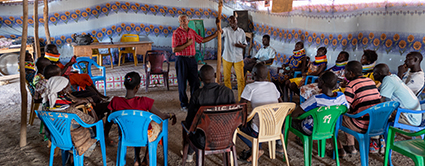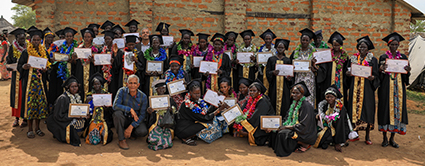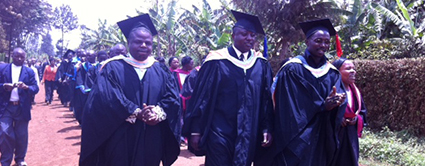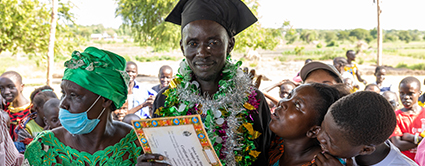Design of STS Oral Bible Schools
The basic structure of an Oral Bible School is, twelve students, hosted locally, shepherded by national STS instructors. They use the STS method to learn Bible stories and study them oral style. No faculty—no campus—locally supported.
The students, a mixture of non-literate, semi-literate and preferred oral learners, learn how to dig deeply into Bible stories to discover treasures and how to teach others through discussion.
Oral Bible Schools can be organized in many different ways. Our leaders have experimented with a variety of different models for Oral Bible Schools. We have found that no one schedule works for all locations.
Typically, the 12 students divide into two groups and each group prepares a different story. After the preparation, one person goes as the storyteller to the other group. They tell the story and have a full discussion. Through that process, the five members of the group who hadn’t learned that particular story learn the new story as well. By the end of the preparation/presentation cycle, both groups have experienced two stories. The storytellers have homework, they must also learn the story they didn’t work on.
As a result of all this time spent together in the Word, not only do these people learn the process of STS, they gain a deep understanding of God and His Word. They also develop very deep relationships with one another.
The time that the groups meet really depends on the situation in their particular area. They may meet at home, at church, or under a tree. If they are farmers, they may stop during planting or harvesting seasons and start up again later. They may meet on a two-weeks on and two-weeks off cycle. They adjust the schedule to fit their needs.
In cities in India, OBS groups oftentimes meet in the evening, five nights a week. In the US, there are groups that meet once each Saturday because that fits their schedule. In the Middle East, there are people who meet every other Saturday. They wish they could meet more often, but that’s all the time they have. Oral Bible Schools can be adapted to fit whatever the situation.
The leader in the Philippines referred to earlier, has been doing Oral Bible Schools in many different ways. He’s even done some using his cell phone. A group of men get together and have an STS Bible study. They set up a cell phone as a speakerphone in the middle of the group. Our Filipino leader checks in with them once a week in this way. At one time, he may have six cell phones lying in front of him and he’ll be working with six different Oral Bible Schools from all around the country, all at same time.
In Africa, the most common schedule has been two weeks on two weeks off. Each month that the students are part of the Oral Bible School, they attend two weeks of school and return home for two weeks. This schedule allows the students to complete the STS-OBS eight-month curriculum of learning and preparing Scripture passages and stories in about a year and a half. Because of the flexible structure of Oral Bible Schools, the schedule can be easily adjusted to meet the needs of each group of students.
During the two weeks that the students are in school, they learn stories and practice them in local outreaches. When back in their home villages, the students tend to their ministries, families and fields. This alternating schedule makes the students' time away from their homes and villages much less of a hardship.
In each two-week period, the students to learn from 15-20 stories. While at home, they put those stories to use! That home-practice time solidifies the stories in the students’ minds and places the stories deep in their “heart pockets.”
By the time of graduation, most graduates know nearly to 300 stories, which they then carry everywhere in their heart pockets. STS oral schools are producing dynamic church planters and teachers.
The graduates have also been found to have a deep knowledge of Biblical theology. Although they haven’t studied systematic theology as part of the Oral Bible School, an understanding of narrative theology comes as part of understanding the Bible stories themselves. This surprising benefit has been documented by seminaries in the west.





